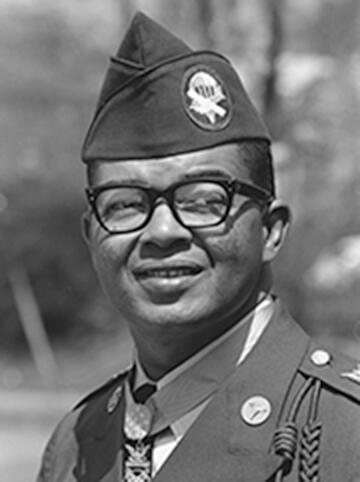Spc. Lawrence Joel
USCIS Charlotte Field Office

Army Specialist 6 Lawrence Joel was born on Feb. 22, 1928, in Winston-Salem, North Carolina. He attended Atkins High School and joined the Army on his 18th birthday in 1946. During his three-year enlistment, he served in France, Germany, and Italy.
In 1953, Specialist Joel re-joined the Army as an airborne medic. After assignments in Lebanon and Alaska, he joined the 1st Battalion, 503rd Infantry, 173rd Airborne Brigade in Okinawa, Japan, in November 1964. In 1965, the 173rd became the first major U.S. Army unit to serve in Vietnam.
On Nov. 8, 1965, halfway through the 173rd’s tour of duty in Vietnam, Specialist Joel joined squads from Company C, 1st Battalion, 503rd Infantry during Operation Hump. The mission, which was named in recognition of the unit’s halfway point, was designed to drive out Viet Cong soldiers in the jungles near Bien Hoa. In an interview, Specialist Joel said the daylong patrol was, “fairly routine…just like back at Fort Bragg—going to play war games.” Instead, they walked into a Viet Cong ambush.
Reports state the 503rd Infantry was up against 1,200 enemy soldiers who wounded or killed nearly every man in the lead squad of C Company. While tending to the wounded, a machine gun struck Specialist Joel in his right leg. He bandaged his own wound, self-administered morphine to deaden the pain, and used a makeshift crutch to continue his mission of administering life-saving care to fellow soldiers.
His Medal of Honor citation, in part, reads:
“After being struck a second time and with a bullet lodged in his thigh, he dragged himself over the battlefield and succeeded in treating 13 more men before his medical supplies ran out. Displaying resourcefulness, he saved the life of 1 man by placing a plastic bag over a severe chest wound to congeal the blood. Throughout the long battle, Sp6c. Joel never lost sight of his mission as a medical aidman and continued to comfort and treat the wounded until his own evacuation was ordered. His meticulous attention to duty saved a large number of lives and his unselfish, daring example under most adverse conditions was an inspiration to all.”
Specialist Joel spent three months in hospitals in Saigon and Tokyo. He received the Silver Star, and on March 9, 1967, he received the Medal of Honor from then-President Lyndon B. Johnson during a ceremony at the White House.
Specialist Joel died on Feb. 4, 1984, from complications with diabetes. He is buried in Arlington National Cemetery.
